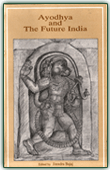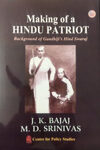
Ayodhya And The Future India
From the back cover of the book:
The Ayodhya events signify the beginning of the end of a phase of Indian history. The republic, constituted as a successor regime to the British and the Mughals, no longer seems so viable. And, it is time to begin exploring the future directions of Indian polity.
Having taken over the levers and the trappings of imperial power in India the new ruling elite quickly convinced itself that the courthouses, the circuit bungalows and the magisterial residences built by the British, as also the various manuals and codes of departmental and courtly procedure, created by them and the earlier Mughal rulers, were essential to the governance of the Indian people. Even the symbols of Indian defeat became the treasured inheritance of the Indian state.
The Ayodhya events have broken the reverie. They have come as a rude jolt to many who had begun to imagine that they were now in a position to do what the conquerors of the past had failed to accomplish: To make the people of India forget their intrinsic Indianness, their essential rootedness in the Indian civilisation. The Ayodhya events have shown that the people of India have not given up. They continue to keep their own counsel about what is worth preserving in the Indian past and what needs to be forgotten. And, thus they have forced us to begin thinking beyond merely finding ways of somehow carrying on with the mantle of the dead and departed imperialists of our past.
In the talks and discussions collected in this volume leaders of different sections of Indian opinion engage in an exploration of the essential questions facing the nation in the context of the Ayodhya events, with great concern and transparent frankness.
CONTRIBUTORS
ARUN SHOURIE, former editor of Indian Express. SANJIVI GUHAN, emeritus professor at the Madras Institute of Development Studies. ABDUS SAMAD, veteran parliamentarian and president of the Indian Union Muslim League in Tamilnadu. CASIMIR GNANADICKAM, the most reverend the archbishop of Madras-Mylapore. S. Gurumurthy, chartered accountant and political commentator. K. N. GOVINDACHARYA, general secretary of the B.J.P. DHARAMPAL, a pioneering historian of society and polity in the eighteenth century India. JITENDRA BAJAJ, director of the Centre for Policy Studies, Madras.
J. K. Bajaj (edited)
Centre for Policy Studies, Chennai, 1993
ISBN 81-86041-02-8 hb
ISBN 81-86041-03-6 pb
Price Rs.160/- hb
Price Rs.120/- pb



